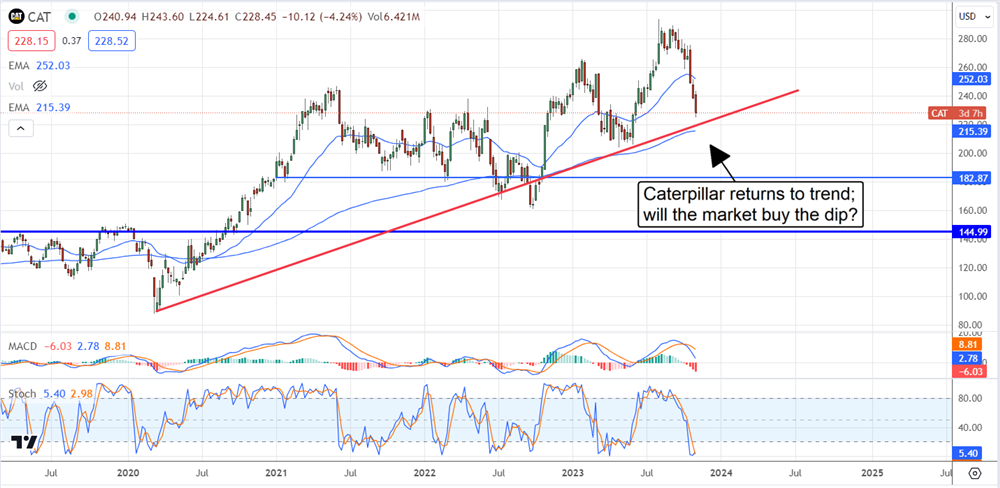- Caterpillar shares are down despite posting solid results and capital returns.
- Analysts see the stock moving higher, but there are concerns of slowing growth.
- Widening margins and an outlook for dividend distribution growth offset slowing growth.
Shares of Caterpillar Inc (NYSE:CAT) fell after a sequential slow-down in business. The slowdown suggests slowing in the industrial equipment industry, foreshadowed by competitors such as Volvo (OTC:VLVLY), but it’s not the worry for investors that it could be. For 1, the slowdown is seasonally expected, and for another, top and bottom-line results and inventory data suggest another strong quarter underway.
In this light, shares of Caterpillar may fall further, but so long as the market remains above critical levels, the uptrend is intact. The uptrend in Caterpillar is supported by $1.3 trillion in infrastructure spending, $7 billion in hydrogen grants, and billions more in tax incentives, not counting stimulus and incentives outside the US and a super-cycle in the oilfields, so it is solid and enduring.
Caterpillar demand drives solid results
Caterpillar has a solid quarter with demand, mix, and pricing, aiding results in all segments. Construction led with a 12% gain, followed by an 11% increase in Energy, 9% in Resources, and 3% in other. Total Machine & Energy sales are up 12%, driven by infrastructure and oilfield demand. Better yet, the top line outpaced the consensus by 150 basis points, with signs demand will persist into the current quarter at least. Regionally, Latin America is the only area of weakness; all other significant segments posted solid double-digit growth.
Margin news is also favorable to a rebound in the price action. The company widened its operating margin on revenue leverage driven by pricing, mix, and volume. Operating margin improved by 430 bps GAAP and adjusted to leave the Q3 earnings up 40% compared to last year. The $5.52 also beat the consensus estimate by 1500 basis points and will likely result in upward revisions to the estimates despite fears of slowing growth.
Caterpillar didn’t give guidance in its Q3 press release, but inventory data suggests at least 1 more quarter of solid results. The top and bottom-line gains were driven by shipments to end-users, partially offset by weaker-than-expected inventory growth at dealerships. With end-user demand strong, investors should expect dealer inventory-related demand to remain solid.
Caterpillar is down 5%, capital returns are safe
Fears of slowing growth have Caterpillar down 5% but may be misplaced. The fear is centered on inflation and how it will affect pricing power; without the impact of hot inflation, Caterpillar's growth could slow to low single-digits or stall, but there is a silver lining. The impact of declining inflation should help Caterpillar sustain or improve its margin and drive cash flow and earnings for investors.
Caterpillar’s capital returns topped $1 billion for the quarter, including dividends and repurchases. Dividends are the bulk of the return at $0.7 billion, which amounts to an annualized 2.15% at the pre-release price point. Because the company pays only 25% of its earnings as dividends, the distribution is reliably safe; because it is a Dividend Aristocrat with a 9% CAGR, investors can expect substantial distribution increases regardless of the top-line growth.
Regarding Caterpillar’s balance sheet, it is a fortress, so there is little to worry about. The company’s cash balance is down YOY but offset by an increase in current and total assets, with liabilities relatively unchanged. This has investor equity up about 30% and leverage low near 2X.
The technical outlook: Caterpillar returns to trend
Price action in Caterpillar stock fell more than 5% in pre-market trading and is returning to trend. The critical support level is near $225 and may be tested soon. Assuming the market takes advantage of the opportunity, the price action should confirm support and possibly rebound quickly. In that scenario, Caterpillar shares may range between $225 and $290 until more news is available. If not, the market could break the trend and send the stock a deeper value and higher yield. 
